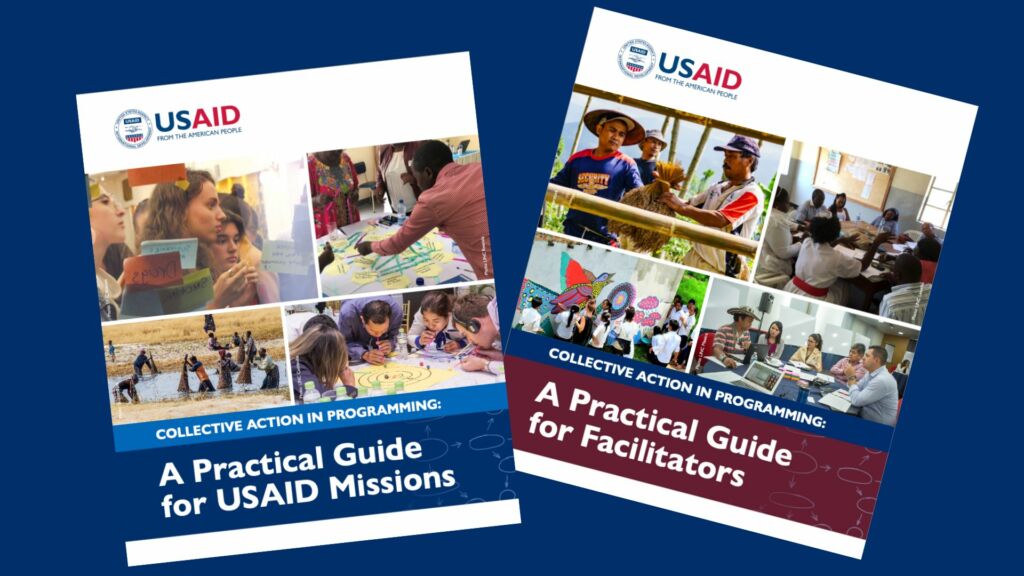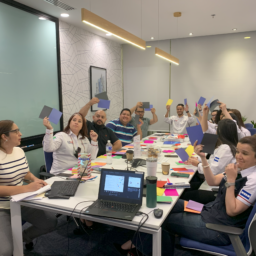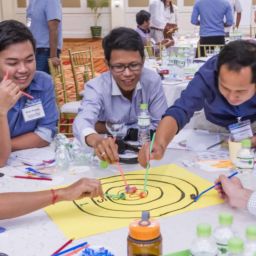This is the third of four blogs LINC is publishing to celebrate its 10th anniversary.
Welcome to the third entry of LINC’s 10th-anniversary blog series!
If you’ve been following along, in our first entry, “Getting to Know LINC”, you learned about LINC’s history and vision, its people, and that “working alongside local actors to create sustained change” is what inspires LINC’s work. From our second entry, “A Decade Supporting Locally Led Development”, you learned about LINC’s focus on locally led development, and how our work with and support to local organizations in Mexico showed us how locally led development not only leads to sustainable solutions but also serves as a multiplier of development opportunities that we are still witnessing ten years later.
In our third entry, we share our experience in Monitoring, Evaluation, Research, and Learning (MERL), which is currently LINC’s largest practice area. We discuss how our evaluation and research work has taken LINC to almost every corner of the world, allowing us to work with communities, government, and private sector actors from a wide range of countries and cultures, testing innovative tools and approaches, and how research and learning is imbedded in LINC’s DNA.
Since its early years, LINC has been actively involved in assessing, compiling, and sharing best practices, strategies, and impacts of development programs that empower local actors to lead their own development. As we often say, we help development actors understand what works and what doesn’t. LINC does this by using a variety of tools and techniques to better design, capture, and understand impact and change, and to elevate the perspectives of local actors involved in the processes. LINC’s MERL efforts are conducted in collaboration with national and international universities, think tanks, NGOs, and government and private sector partners.
Some Past Examples of LINC’s MERL Work
Since 2016, LINC has been part of the Strategic Program for Analyzing Complexity and Evaluating Systems (SPACES), implemented by a John Hopkins University-led consortium. SPACES is a buy-in mechanism through which LINC helps USAID Missions and Bureaus think systemically and apply tools such as social network analysis, participatory systems mapping, and outcomes harvesting. To date, LINC has implemented activities in seven countries and on several global activities.
Learn more about our work under SPACES:
The images show members of the FFS research team and of the Action Learning Groups.
One of these activities was the evaluation of the Data Collaboratives for Local Impact (DCLI) program in Tanzania. DCLI’s goal was to positively increase the frequency and effectiveness of data use for decision-making in policies and programs related to HIV/AIDS and health, gender equity, and economic growth. Using an adapted outcome harvesting methodology, our evaluation found that supporting localization using a community led-planning process, combining high-quality training with mentoring and practice, and partnering with local actors in the implementation of the programs, were the biggest keys to success. Learn more: Learning Brief: Evaluation of the Millennium Challenge Corporation’s Data and Innovation Grants Portfolio in Tanzania.
From 2017-2020, LINC, along with our partners Peace Direct and Foundation Center (now Candid), led the Facilitating Financial Sustainability (FFS) Activity, to understand what factors are conducive to the financial sustainability of civil society organizations (CSOs). FFS designed and conducted case-based research in six countries, considering geographic diversity and different levels of economic development and stability.
The research included qualitative and quantitative approaches: the research team conducted a Qualitative Comparative Analysis (QCA) to identify the ways in which different factors interact to impact the financial sustainability of CSOs in different environments, and the strategies available to (CSOs) to achieve sustainability in complex settings. The team also conducted quantitative analysis of the grants that support financial sustainability in each of the six countries. The analysis provided an overall perspective on which funders were supporting financial sustainability, what strategies funders used to support financial sustainability, and what types of CSOs were receiving financial sustainability support.
Among its findings, the research showed that though critical, financial sustainability is a highly under-resourced issue for CSOs, as only five percent of the grants awarded to the organizations support financial sustainability. The research also revealed the importance of Social Capital as an “invisible resource” for CSOS, as it enables their resilience to the ups and downs of donor funding. Access the Research Synthesis Report to learn more about the research approach and findings.
Once the research was done, the FFS team tested its practical implications by implementing Action Learning Group (ALGs) in three countries. The ALGs generated findings of its own; one of which showed that when facilitating collective action exercises, implementing partners must plan enough time for the group to form and build trust, as the basis for group cohesion and strengthened capacity. Learn more findings in the Action Learning Brief.
Current Project Examples
LINC is a prime holder of two MERL-focused Indefinite Delivery, Indefinite Quantity (IDIQ) awards, the Kenya and East Africa Evaluation, Assessments, and Analyses (KEA EAA) IDIQ and the Monitoring, Evaluation, and Learning Services (EVAL-ME II) IDIQ.
Through the KEA EAA IDIQ, LINC and its partners conduct a diverse array of evaluations, assessments, and analyses for USAID, implementing partners, and Kenyan stakeholders. LINC’s projects under KEA EAA include:
- Assessing and Informing Teleworking Practices
- USAID/Somalia Expanding Access to Justice Program Evaluation
- USAID/KEA Local Organizations Market Research
- USAID/Kenya AVCD Program Performance Evaluation
- USAID/Kenya IGAPP Evaluations
The EVAL ME II IDIQ supports USAID Missions and Operating Units more effectively support countries as they become more self-reliant. Activities under this IDIQ fund a range of analytical services, including evaluations, performance monitoring, collaborative, learning, and adapting (CLA) and knowledge management; and monitoring, evaluation, and learning (MEL) capacity building. LINC’s partners are The Cloudburst Group, RTI International, and DevLab@Penn.
Some of LINC’s projects under EVAL ME II include:
- $16.5 Ghana Monitoring, Evaluation, and Learning (MEL) Platform
- $7.6 million Monitoring and Evaluation Support for Adaptation (MESA) Activity in Mexico.
- LASER Mid-Term Performance Evaluation
- Final Performance Evaluation of the Local Partner Development Activity in Jamaica
On the two MEL Platforms in particular, LINC implements a diverse array of MERL related activities, including data quality assessments, performance and impact evaluations, sector studies, and GIS-related work.
“LINC demonstrated exceptional management of the task order (…) The evaluation products delivered by LINC were of very high quality (…) LINC proposed and implemented a thorough methodology (…) They were very proactive throughout the evaluation and offered solutions to issues during the award.” Jamaica LPD Evaluation CPAR
LINC also implements the $20m, five-year (2022-2027) USAID/Ethiopia Resilience Learning Activity (RLA), which supports USAID/Ethiopia and its implementing partners, helping them to better understand what relief and development interventions can help make households, communities, and systems more resilient to increasingly persistent shocks and stresses. RLA provides services to USAID’s $1 billion development and humanitarian resilience portfolio in Ethiopia.
Knowledge-Sharing and Thought Leadership
In addition to implementing MERL activities around the world, LINC regularly and actively participates in evaluation and learning panels and conferences organized by development and evaluation industry stakeholders, such as the American Evaluation Association (AEA). You can learn more about LINC’s participation in the AEA in this link and in this link.
LINC also contributes to USAID’s Learning Lab. Most recently, with the LINC-developed Collective Action for USAID Programming toolkit, which includes practical resources for USAID Missions and facilitators, and case stories on Collective Action from around the world.
LINC regularly shares learning material and information on our website, social media, and other channels.
At LINC, we see MERL as a critical piece of locally led development, by providing clear and necessary data about what works and what doesn’t. It sets the path for accountability and innovation, both necessary for success. LINC is looking forward to continuing to apply MERL tools in our programs and sharing our lessons learned in the process.
This article was authored by Stephanie Lacouture and Rich Fromer.




